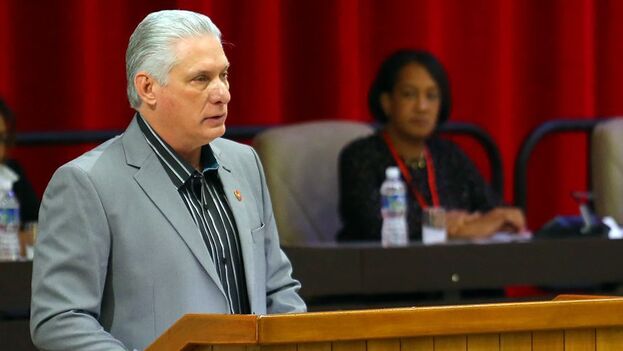
![]() 14ymedio, Juan Izquierdo, Havana, 12 December 2022 — With a tearful speech about his “personal dissatisfactions” as the head of the Government and in the presence of Raúl Castro, Miguel Díaz-Canel was accountable this Wednesday, at the Havana Convention Center, for his management of the country during 2022.
14ymedio, Juan Izquierdo, Havana, 12 December 2022 — With a tearful speech about his “personal dissatisfactions” as the head of the Government and in the presence of Raúl Castro, Miguel Díaz-Canel was accountable this Wednesday, at the Havana Convention Center, for his management of the country during 2022.
To the usual justifications to explain the economic drift of the Island — the US ’blockade’, the aftermath of the coronavirus pandemic and the disasters caused by Hurricane Ian and the explosion of the Supertanker Base — he added, with care not to offend Russia, “the new problems generated by the conflict in Europe” and international inflation.
Faced with the economic crisis, he said he felt like the “main person responsible,” but nuanced this by stating that he had limited himself to assuming “continuity from a dialectical perspective.” He did not miss an opportunity to rebuke local and provincial bureaucrats and clarified that, although he knows what the problems are, he hopes that “no one will use them as justification.”
The National Assembly of People’s Power, he warned, will continue in 2023 its “important legislative work” to enact other laws that “develop the Constitution” and address the “difficult Cuban daily life.”
The president was slow to enter into economic matters, and when he did it was to repeat the opinion of the Minister of Economy, Alejandro Gil, during the plenary of the Communist Party: the situation is “difficult”; the Government no longer knows where to extract the necessary currency, and the measures of the Ordering Task* were not enough to alleviate the financial disaster.
He spoke cryptically about the “increase in the income of natural people without productive support” and was alarmed by the “partial dollarization of the economy,” which has had a significant impact on the rise in product prices.
After vaguely criticizing Washington for keeping the ’blockade’ as a “weapon of coercion, cruel, illegitimate and immoral,” Díaz-Canel praised the Biden Administration. He said he was interested in the “two million people of Cuban origin and their descendants” who live in Florida and stated that he wanted to “promote broader ties” with the US.
He mentioned the technical advice offered by US authorities during the explosion of the Supertanker Base, despite the fact that the official press initially denied the existence of such aid and then considered it “insufficient.”
Díaz-Canel also recalled that the US donated 100 fire suits, in addition to fire and protection equipment, which arrived in Cuba a week ago. It was a “welcome and accepted” initiative, he said with modesty.
In addition, he spoke of the two million dollars sent by the United States Agency for International Development (USAID) — one of the US institutions that the regime has criticized with the most emphasis — after the passage of Hurricane Ian through Western Cuba. “A help without conditions,” he said, attributing it not to USAID but to the Biden Government, “for which we also are thankful and accept it.”
However, he did not miss the opportunity to regret the “open policy of subsidies and attempts to destabilize the country,” paid with “tens of millions of dollars from the federal budget.” The US “trained individuals to commit violent acts against Cuba,” he said, referring to the accusations launched by Cuban Television against alleged criminals against the State captured by the police.
Finally, he recognized that despite everything, Cuba and the US are experiencing a kind of thaw, although with “very discreet steps, aimed at directing bilateral cooperation for compliance with immigration agreements and also in other priority areas between both countries.”
About Vladimir Putin’s invasion of Ukraine, he limited himself to also blaming the US and its “harmful imperialist determination to try to divide the world,” although he admitted that the war complicated the global economic situation.
Regarding his political influence in Latin America and the possibility of alliance with the governments of the Latin American “new left,” he welcomed the rapprochement of Cuba by several presidents, such as Gustavo Petro and Andrés Manuel López Obrador. The “greetings” also reached Daniel Ortega, Luis Arce and Nicolás Maduro, and discreetly pointed out the “mutual benefit” of relations with Argentina, but there was no reference to Chile, with whose president, Gabriel Boric, Havana doesn’t sympathize.
The president avoided mentioning, of course, the former president of Peru, Pedro Castillo, whose self-coup did not merit a comment from the Cuban leadership until two days later.
At the end of the speech– and without finally deciding on triumphalism or self-criticism — Díaz-Canel stated that he felt guilty “for not having been able to achieve, as the country’s leader, the results that the Cuban people need for the desired and hoped-for prosperity.”
*Translator’s note: The “Ordering Task” is a collection of measures that include eliminating the Cuban Convertible Peso (CUC), leaving the Cuban peso as the only national currency, raising prices, raising salaries (but not as much as prices), opening stores that take payment only in hard currency which must be in the form of specially issued pre-paid debit cards, and a broad range of other measures targeted to different elements of the Cuban economy.
Translated by Regina Anavy
____________
COLLABORATE WITH OUR WORK: The 14ymedio team is committed to practicing serious journalism that reflects Cuba’s reality in all its depth. Thank you for joining us on this long journey. We invite you to continue supporting us by becoming a member of 14ymedio now. Together we can continue transforming journalism in Cuba.
